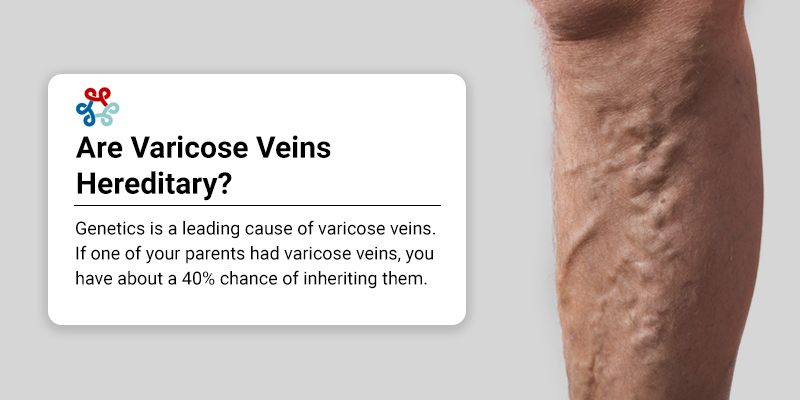

Home > Are Varicose Veins Hereditary?
Updated on May 23, 2023 by Dr. Jonathan Arad (Vein Doctor) of Vein Care Center
Do not let twisted and bulging veins become painful and affect your life. Schedule an appointment with a vein expert doctor to know what might be causing them and how to prevent them from becoming serious complications. The vein specialist doctor Jonathan Arad at the Vein Care Center will help to deal with your symptoms keeping in mind their possible causes, especially if they are hereditary. With a variety of advanced treatment options, you have a chance to enjoy a better quality of life even if you end up developing varicose veins over time.
Varicose veins are swollen, enlarged veins mostly found on the legs and feet, although they can occur in other parts of the body. They can be blue, bluish-purple, or reddish-brown and bulge out like raised tunnels.
Varicose veins are very noticeable as the veins become dilated, twisted, and bumpy, which appear very close to the surface of the skin. Varicose veins cause aches, cramping, heaviness, and throbbing pain in the legs that worsen with time.
Varicose veins result from a vein disorder known as chronic venous insufficiency in which the vein vessels fail to function normally and pump the blood from the legs to the heart. As a result, the veins become enlarged, overfill with blood and begin to twist and curl up.
The thickened, dilated parts of the vein are called varicosities. Research shows that spider veins and varicose veins are very common complaints, particularly in women. Sometimes the symptoms of varicose veins resemble other medical conditions too. It is best to consult your healthcare provider for an accurate diagnosis to know about the best solutions to get rid of vascular diseases.
Varicose veins tend to run in the family, and hereditary factors play a crucial part in causing this condition. Research has revealed that if a close blood relation had varicose veins, there are chances are that you will get them too.
Genetics is a leading cause of varicose veins. If one of your parents had varicose veins, you have about a 40% chance of inheriting them. If both your parents had them, your risk factors increase to 90%.
Many people inherit valve problems from their parents and family members. Having too few valves or valves that do not work well can be a genetic disorder too.
Some people are born with abnormalities of the vein walls. It can result in weakness that causes separation and cracking in vein walls. When someone with a vein problem stands up or walks, the blood flow reverses and flows down the superficial veins instead of moving up towards the heart. It builds up pressure in the superficial veins causing varicosities.

Along with genetics, there are many other possible causes of varicose veins. Some of the risk factors that increase the chances of developing varicose veins include:
You can prevent varicose veins from turning critical with lifestyle changes and at-home remedies. Losing extra pounds and regular walk can keep varicose veins under control. You can switch to a low salt diet to reduce water retention in case of swelling or edema. Keeping your legs elevated above the heart level also encourages a healthy flow of blood.
Other tested and minimally invasive treatments that successfully remove varicose veins include endovenous ablation therapy, sclerotherapy, laser therapy, and intense light pulse (ILP), and ambulatory phlebectomy. There are surgical options such as vein stripping that treat varicose veins for good.
If someone in your family or a parent had varicose veins, consult a doctor to know more about your chances of developing this condition. Varicose veins are more than a cosmetic issue. If left untreated for a long time, they can lead to aches and cramps and result in problems like the reduced circulation of blood, leg ulcers, and discolored, swollen ankles. Dr. Jonathan Arad is a highly trained and experienced varicose vein specialist who will help you understand what you may go through and come up with the most effective treatment and therapeutic options to provide lasting relief.
Dr. Jonathan Arad has either authored or reviewed and approved this content.